Construction Law Assignment: ACL Applicability to Land Developers
VerifiedAdded on 2020/03/07
|11
|2396
|77
Report
AI Summary
This report examines the application of the Australian Consumer Law (ACL) to land developers, focusing on consumer protection within the construction industry. It delves into the concepts of misrepresentation, as defined under sections 18 and 29 of the ACL, detailing how misleading or deceptive conduct and false representations can lead to legal consequences for developers. The report provides examples of misrepresentation, including false claims about property features and inaccurate advertising. Furthermore, it analyzes unfair contract terms in standard form consumer contracts, specifically those related to off-the-plan sales. The report highlights clauses that may be considered unfair, such as those creating an imbalance in rights and obligations, and discusses how such terms can be rendered void under the ACL. The analysis concludes that the ACL provides significant protection to property buyers in Australia, ensuring they are not misled or treated unfairly by developers, and it emphasizes the importance of fairness and transparency in property transactions.
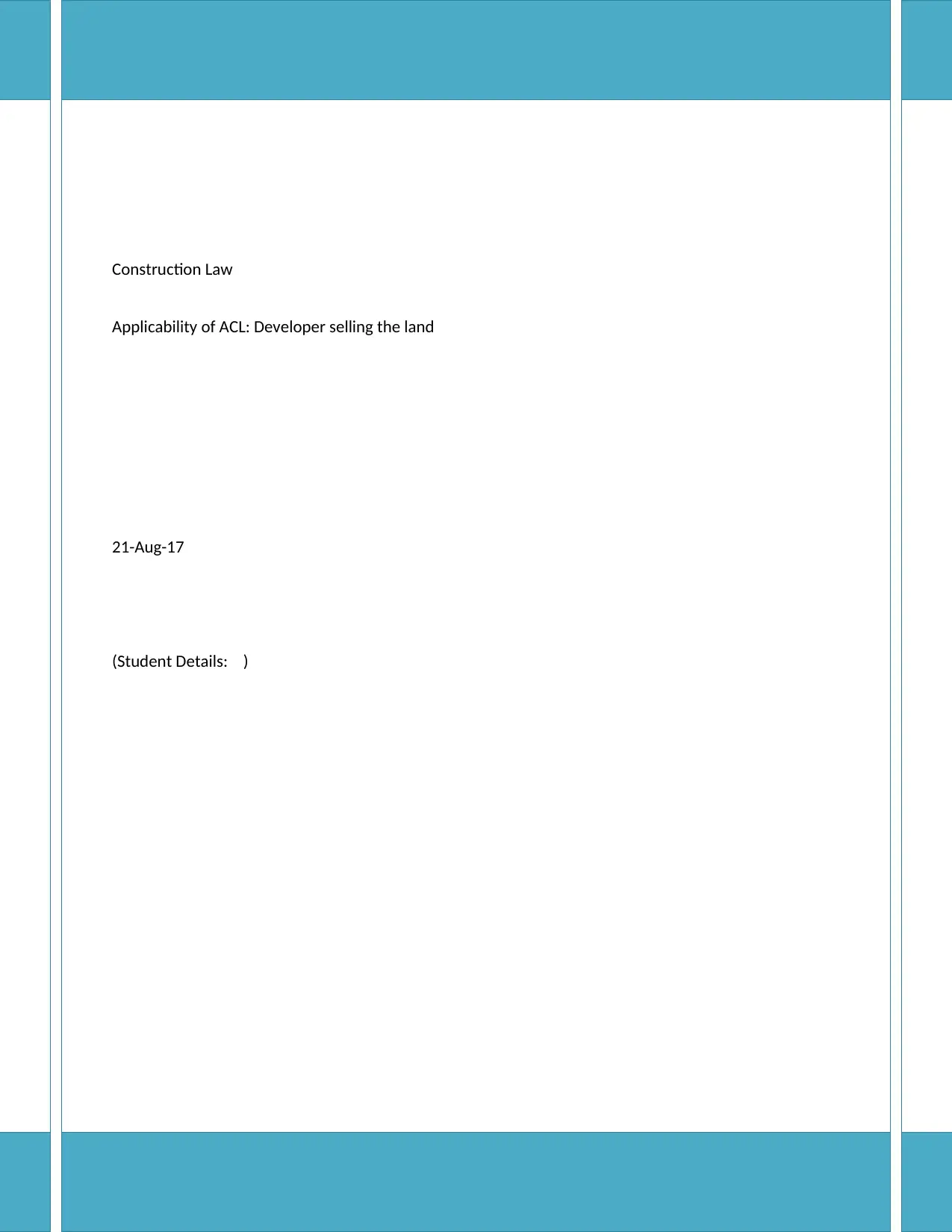
Construction Law
Applicability of ACL: Developer selling the land
21-Aug-17
(Student Details: )
Applicability of ACL: Developer selling the land
21-Aug-17
(Student Details: )
Paraphrase This Document
Need a fresh take? Get an instant paraphrase of this document with our AI Paraphraser
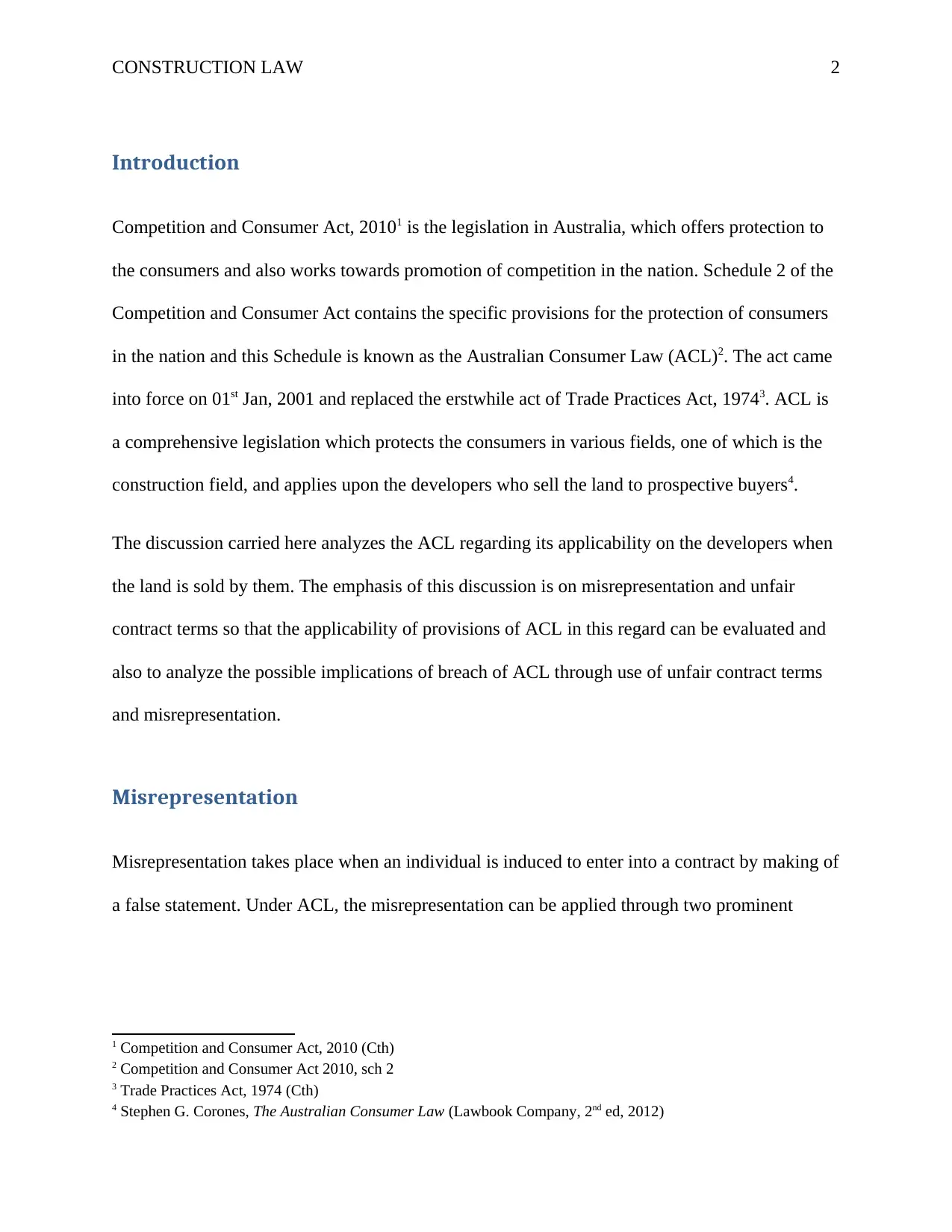
CONSTRUCTION LAW 2
Introduction
Competition and Consumer Act, 20101 is the legislation in Australia, which offers protection to
the consumers and also works towards promotion of competition in the nation. Schedule 2 of the
Competition and Consumer Act contains the specific provisions for the protection of consumers
in the nation and this Schedule is known as the Australian Consumer Law (ACL)2. The act came
into force on 01st Jan, 2001 and replaced the erstwhile act of Trade Practices Act, 19743. ACL is
a comprehensive legislation which protects the consumers in various fields, one of which is the
construction field, and applies upon the developers who sell the land to prospective buyers4.
The discussion carried here analyzes the ACL regarding its applicability on the developers when
the land is sold by them. The emphasis of this discussion is on misrepresentation and unfair
contract terms so that the applicability of provisions of ACL in this regard can be evaluated and
also to analyze the possible implications of breach of ACL through use of unfair contract terms
and misrepresentation.
Misrepresentation
Misrepresentation takes place when an individual is induced to enter into a contract by making of
a false statement. Under ACL, the misrepresentation can be applied through two prominent
1 Competition and Consumer Act, 2010 (Cth)
2 Competition and Consumer Act 2010, sch 2
3 Trade Practices Act, 1974 (Cth)
4 Stephen G. Corones, The Australian Consumer Law (Lawbook Company, 2nd ed, 2012)
Introduction
Competition and Consumer Act, 20101 is the legislation in Australia, which offers protection to
the consumers and also works towards promotion of competition in the nation. Schedule 2 of the
Competition and Consumer Act contains the specific provisions for the protection of consumers
in the nation and this Schedule is known as the Australian Consumer Law (ACL)2. The act came
into force on 01st Jan, 2001 and replaced the erstwhile act of Trade Practices Act, 19743. ACL is
a comprehensive legislation which protects the consumers in various fields, one of which is the
construction field, and applies upon the developers who sell the land to prospective buyers4.
The discussion carried here analyzes the ACL regarding its applicability on the developers when
the land is sold by them. The emphasis of this discussion is on misrepresentation and unfair
contract terms so that the applicability of provisions of ACL in this regard can be evaluated and
also to analyze the possible implications of breach of ACL through use of unfair contract terms
and misrepresentation.
Misrepresentation
Misrepresentation takes place when an individual is induced to enter into a contract by making of
a false statement. Under ACL, the misrepresentation can be applied through two prominent
1 Competition and Consumer Act, 2010 (Cth)
2 Competition and Consumer Act 2010, sch 2
3 Trade Practices Act, 1974 (Cth)
4 Stephen G. Corones, The Australian Consumer Law (Lawbook Company, 2nd ed, 2012)
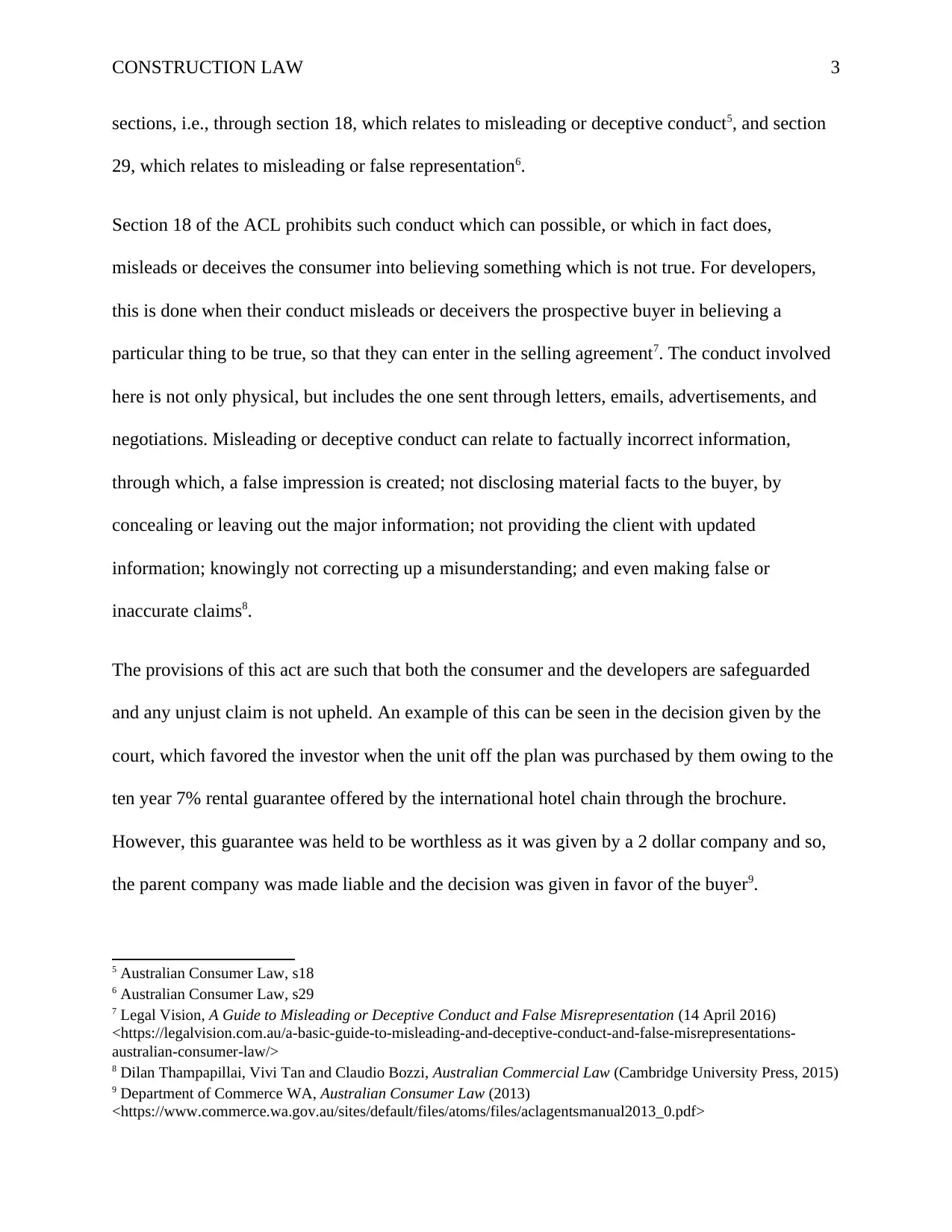
CONSTRUCTION LAW 3
sections, i.e., through section 18, which relates to misleading or deceptive conduct5, and section
29, which relates to misleading or false representation6.
Section 18 of the ACL prohibits such conduct which can possible, or which in fact does,
misleads or deceives the consumer into believing something which is not true. For developers,
this is done when their conduct misleads or deceivers the prospective buyer in believing a
particular thing to be true, so that they can enter in the selling agreement7. The conduct involved
here is not only physical, but includes the one sent through letters, emails, advertisements, and
negotiations. Misleading or deceptive conduct can relate to factually incorrect information,
through which, a false impression is created; not disclosing material facts to the buyer, by
concealing or leaving out the major information; not providing the client with updated
information; knowingly not correcting up a misunderstanding; and even making false or
inaccurate claims8.
The provisions of this act are such that both the consumer and the developers are safeguarded
and any unjust claim is not upheld. An example of this can be seen in the decision given by the
court, which favored the investor when the unit off the plan was purchased by them owing to the
ten year 7% rental guarantee offered by the international hotel chain through the brochure.
However, this guarantee was held to be worthless as it was given by a 2 dollar company and so,
the parent company was made liable and the decision was given in favor of the buyer9.
5 Australian Consumer Law, s18
6 Australian Consumer Law, s29
7 Legal Vision, A Guide to Misleading or Deceptive Conduct and False Misrepresentation (14 April 2016)
<https://legalvision.com.au/a-basic-guide-to-misleading-and-deceptive-conduct-and-false-misrepresentations-
australian-consumer-law/>
8 Dilan Thampapillai, Vivi Tan and Claudio Bozzi, Australian Commercial Law (Cambridge University Press, 2015)
9 Department of Commerce WA, Australian Consumer Law (2013)
<https://www.commerce.wa.gov.au/sites/default/files/atoms/files/aclagentsmanual2013_0.pdf>
sections, i.e., through section 18, which relates to misleading or deceptive conduct5, and section
29, which relates to misleading or false representation6.
Section 18 of the ACL prohibits such conduct which can possible, or which in fact does,
misleads or deceives the consumer into believing something which is not true. For developers,
this is done when their conduct misleads or deceivers the prospective buyer in believing a
particular thing to be true, so that they can enter in the selling agreement7. The conduct involved
here is not only physical, but includes the one sent through letters, emails, advertisements, and
negotiations. Misleading or deceptive conduct can relate to factually incorrect information,
through which, a false impression is created; not disclosing material facts to the buyer, by
concealing or leaving out the major information; not providing the client with updated
information; knowingly not correcting up a misunderstanding; and even making false or
inaccurate claims8.
The provisions of this act are such that both the consumer and the developers are safeguarded
and any unjust claim is not upheld. An example of this can be seen in the decision given by the
court, which favored the investor when the unit off the plan was purchased by them owing to the
ten year 7% rental guarantee offered by the international hotel chain through the brochure.
However, this guarantee was held to be worthless as it was given by a 2 dollar company and so,
the parent company was made liable and the decision was given in favor of the buyer9.
5 Australian Consumer Law, s18
6 Australian Consumer Law, s29
7 Legal Vision, A Guide to Misleading or Deceptive Conduct and False Misrepresentation (14 April 2016)
<https://legalvision.com.au/a-basic-guide-to-misleading-and-deceptive-conduct-and-false-misrepresentations-
australian-consumer-law/>
8 Dilan Thampapillai, Vivi Tan and Claudio Bozzi, Australian Commercial Law (Cambridge University Press, 2015)
9 Department of Commerce WA, Australian Consumer Law (2013)
<https://www.commerce.wa.gov.au/sites/default/files/atoms/files/aclagentsmanual2013_0.pdf>
⊘ This is a preview!⊘
Do you want full access?
Subscribe today to unlock all pages.

Trusted by 1+ million students worldwide
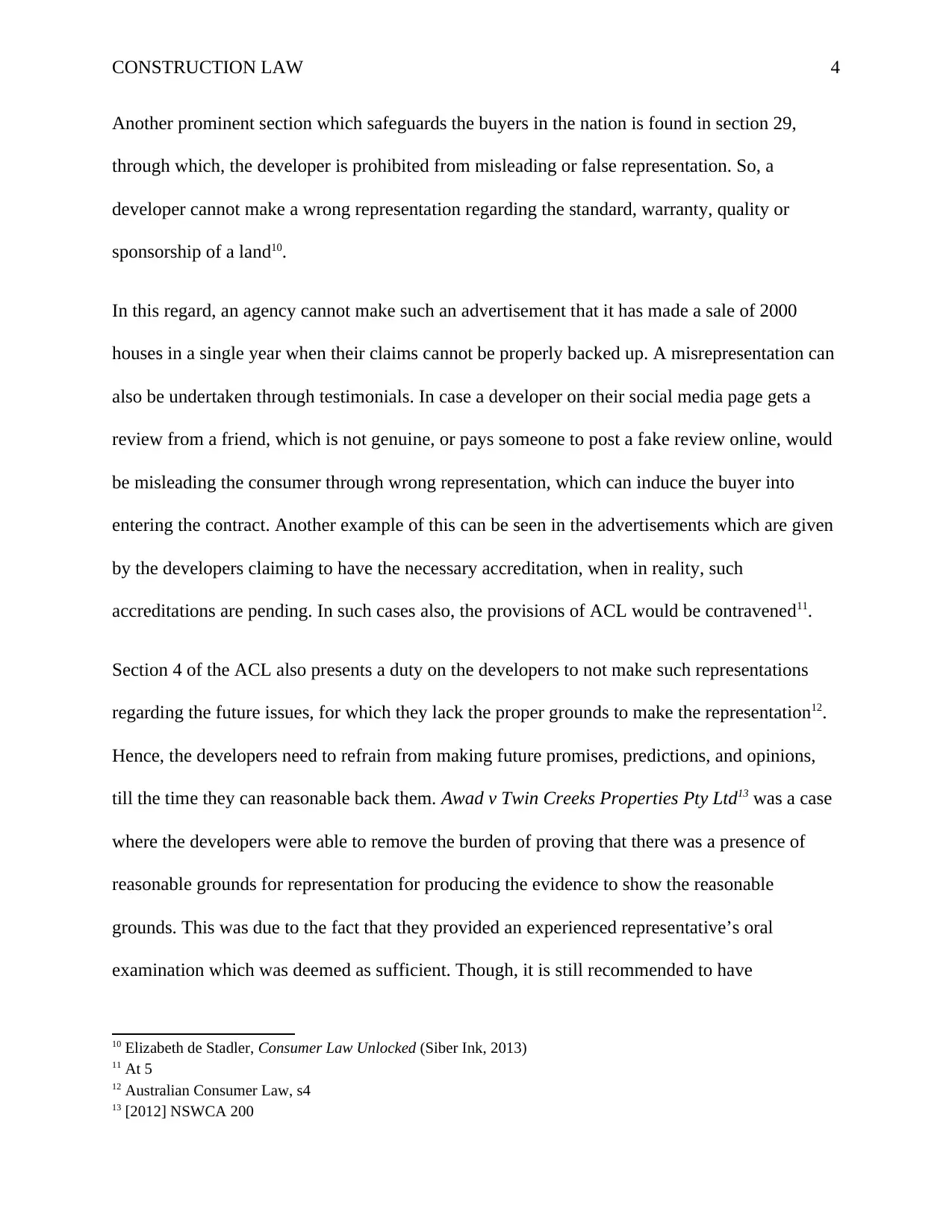
CONSTRUCTION LAW 4
Another prominent section which safeguards the buyers in the nation is found in section 29,
through which, the developer is prohibited from misleading or false representation. So, a
developer cannot make a wrong representation regarding the standard, warranty, quality or
sponsorship of a land10.
In this regard, an agency cannot make such an advertisement that it has made a sale of 2000
houses in a single year when their claims cannot be properly backed up. A misrepresentation can
also be undertaken through testimonials. In case a developer on their social media page gets a
review from a friend, which is not genuine, or pays someone to post a fake review online, would
be misleading the consumer through wrong representation, which can induce the buyer into
entering the contract. Another example of this can be seen in the advertisements which are given
by the developers claiming to have the necessary accreditation, when in reality, such
accreditations are pending. In such cases also, the provisions of ACL would be contravened11.
Section 4 of the ACL also presents a duty on the developers to not make such representations
regarding the future issues, for which they lack the proper grounds to make the representation12.
Hence, the developers need to refrain from making future promises, predictions, and opinions,
till the time they can reasonable back them. Awad v Twin Creeks Properties Pty Ltd13 was a case
where the developers were able to remove the burden of proving that there was a presence of
reasonable grounds for representation for producing the evidence to show the reasonable
grounds. This was due to the fact that they provided an experienced representative’s oral
examination which was deemed as sufficient. Though, it is still recommended to have
10 Elizabeth de Stadler, Consumer Law Unlocked (Siber Ink, 2013)
11 At 5
12 Australian Consumer Law, s4
13 [2012] NSWCA 200
Another prominent section which safeguards the buyers in the nation is found in section 29,
through which, the developer is prohibited from misleading or false representation. So, a
developer cannot make a wrong representation regarding the standard, warranty, quality or
sponsorship of a land10.
In this regard, an agency cannot make such an advertisement that it has made a sale of 2000
houses in a single year when their claims cannot be properly backed up. A misrepresentation can
also be undertaken through testimonials. In case a developer on their social media page gets a
review from a friend, which is not genuine, or pays someone to post a fake review online, would
be misleading the consumer through wrong representation, which can induce the buyer into
entering the contract. Another example of this can be seen in the advertisements which are given
by the developers claiming to have the necessary accreditation, when in reality, such
accreditations are pending. In such cases also, the provisions of ACL would be contravened11.
Section 4 of the ACL also presents a duty on the developers to not make such representations
regarding the future issues, for which they lack the proper grounds to make the representation12.
Hence, the developers need to refrain from making future promises, predictions, and opinions,
till the time they can reasonable back them. Awad v Twin Creeks Properties Pty Ltd13 was a case
where the developers were able to remove the burden of proving that there was a presence of
reasonable grounds for representation for producing the evidence to show the reasonable
grounds. This was due to the fact that they provided an experienced representative’s oral
examination which was deemed as sufficient. Though, it is still recommended to have
10 Elizabeth de Stadler, Consumer Law Unlocked (Siber Ink, 2013)
11 At 5
12 Australian Consumer Law, s4
13 [2012] NSWCA 200
Paraphrase This Document
Need a fresh take? Get an instant paraphrase of this document with our AI Paraphraser
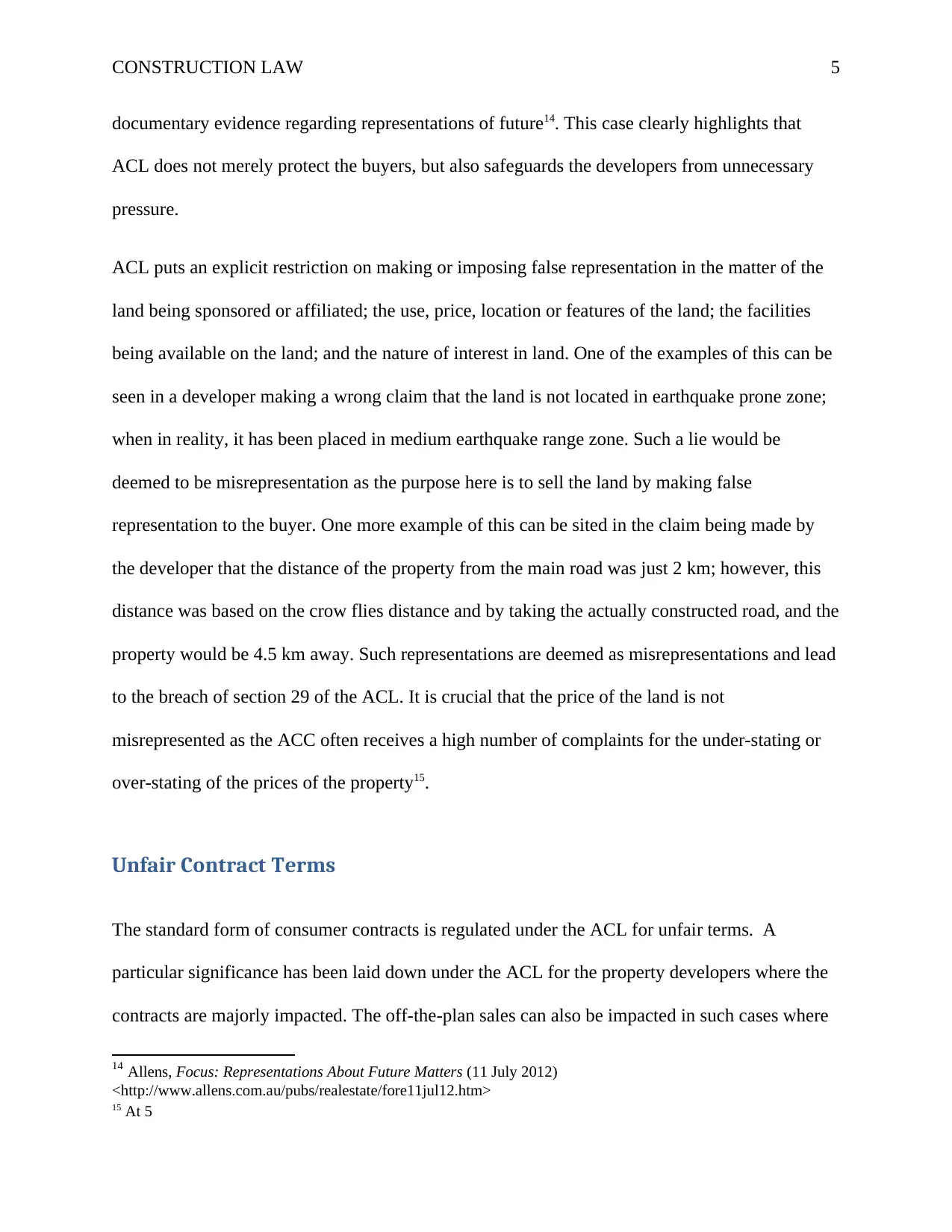
CONSTRUCTION LAW 5
documentary evidence regarding representations of future14. This case clearly highlights that
ACL does not merely protect the buyers, but also safeguards the developers from unnecessary
pressure.
ACL puts an explicit restriction on making or imposing false representation in the matter of the
land being sponsored or affiliated; the use, price, location or features of the land; the facilities
being available on the land; and the nature of interest in land. One of the examples of this can be
seen in a developer making a wrong claim that the land is not located in earthquake prone zone;
when in reality, it has been placed in medium earthquake range zone. Such a lie would be
deemed to be misrepresentation as the purpose here is to sell the land by making false
representation to the buyer. One more example of this can be sited in the claim being made by
the developer that the distance of the property from the main road was just 2 km; however, this
distance was based on the crow flies distance and by taking the actually constructed road, and the
property would be 4.5 km away. Such representations are deemed as misrepresentations and lead
to the breach of section 29 of the ACL. It is crucial that the price of the land is not
misrepresented as the ACC often receives a high number of complaints for the under-stating or
over-stating of the prices of the property15.
Unfair Contract Terms
The standard form of consumer contracts is regulated under the ACL for unfair terms. A
particular significance has been laid down under the ACL for the property developers where the
contracts are majorly impacted. The off-the-plan sales can also be impacted in such cases where
14 Allens, Focus: Representations About Future Matters (11 July 2012)
<http://www.allens.com.au/pubs/realestate/fore11jul12.htm>
15 At 5
documentary evidence regarding representations of future14. This case clearly highlights that
ACL does not merely protect the buyers, but also safeguards the developers from unnecessary
pressure.
ACL puts an explicit restriction on making or imposing false representation in the matter of the
land being sponsored or affiliated; the use, price, location or features of the land; the facilities
being available on the land; and the nature of interest in land. One of the examples of this can be
seen in a developer making a wrong claim that the land is not located in earthquake prone zone;
when in reality, it has been placed in medium earthquake range zone. Such a lie would be
deemed to be misrepresentation as the purpose here is to sell the land by making false
representation to the buyer. One more example of this can be sited in the claim being made by
the developer that the distance of the property from the main road was just 2 km; however, this
distance was based on the crow flies distance and by taking the actually constructed road, and the
property would be 4.5 km away. Such representations are deemed as misrepresentations and lead
to the breach of section 29 of the ACL. It is crucial that the price of the land is not
misrepresented as the ACC often receives a high number of complaints for the under-stating or
over-stating of the prices of the property15.
Unfair Contract Terms
The standard form of consumer contracts is regulated under the ACL for unfair terms. A
particular significance has been laid down under the ACL for the property developers where the
contracts are majorly impacted. The off-the-plan sales can also be impacted in such cases where
14 Allens, Focus: Representations About Future Matters (11 July 2012)
<http://www.allens.com.au/pubs/realestate/fore11jul12.htm>
15 At 5
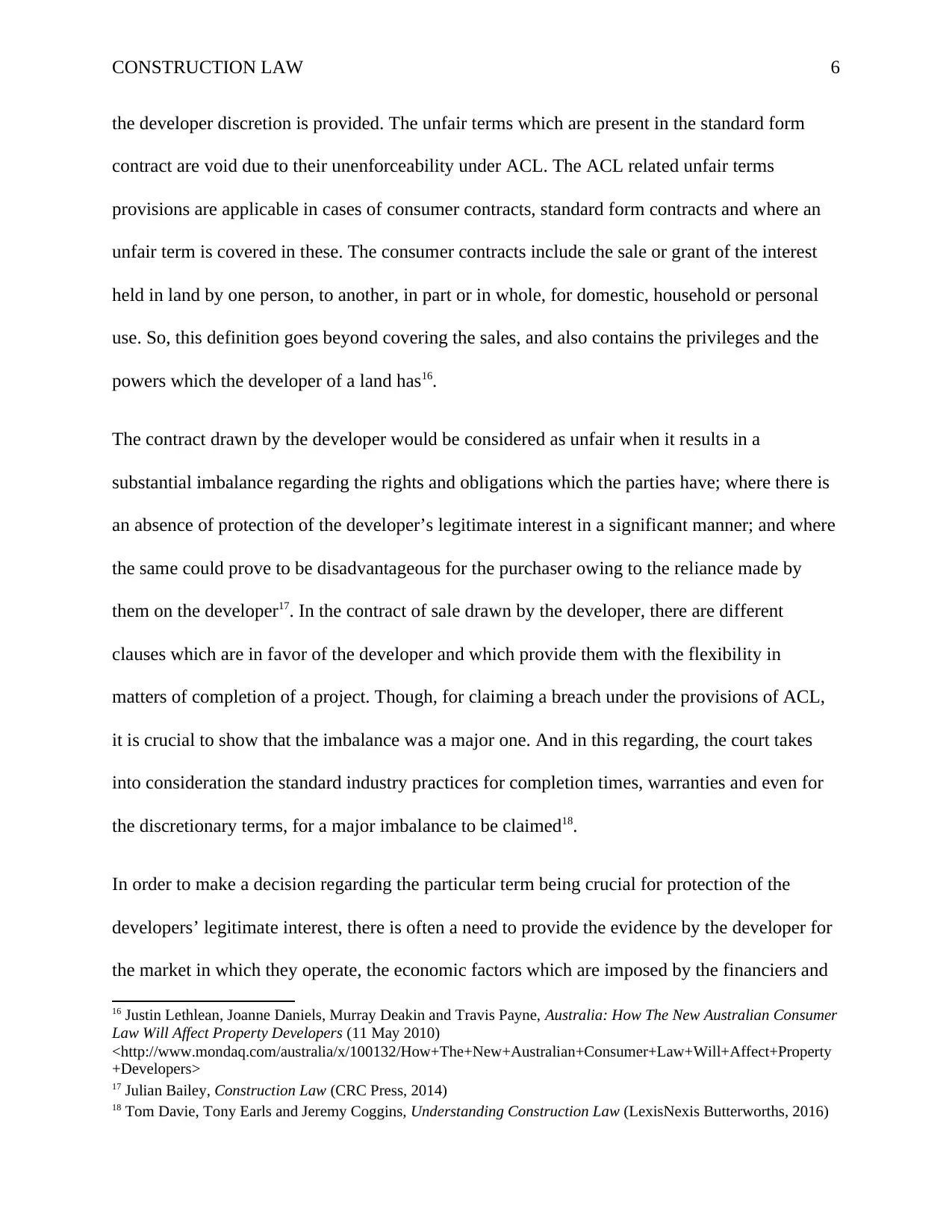
CONSTRUCTION LAW 6
the developer discretion is provided. The unfair terms which are present in the standard form
contract are void due to their unenforceability under ACL. The ACL related unfair terms
provisions are applicable in cases of consumer contracts, standard form contracts and where an
unfair term is covered in these. The consumer contracts include the sale or grant of the interest
held in land by one person, to another, in part or in whole, for domestic, household or personal
use. So, this definition goes beyond covering the sales, and also contains the privileges and the
powers which the developer of a land has16.
The contract drawn by the developer would be considered as unfair when it results in a
substantial imbalance regarding the rights and obligations which the parties have; where there is
an absence of protection of the developer’s legitimate interest in a significant manner; and where
the same could prove to be disadvantageous for the purchaser owing to the reliance made by
them on the developer17. In the contract of sale drawn by the developer, there are different
clauses which are in favor of the developer and which provide them with the flexibility in
matters of completion of a project. Though, for claiming a breach under the provisions of ACL,
it is crucial to show that the imbalance was a major one. And in this regarding, the court takes
into consideration the standard industry practices for completion times, warranties and even for
the discretionary terms, for a major imbalance to be claimed18.
In order to make a decision regarding the particular term being crucial for protection of the
developers’ legitimate interest, there is often a need to provide the evidence by the developer for
the market in which they operate, the economic factors which are imposed by the financiers and
16 Justin Lethlean, Joanne Daniels, Murray Deakin and Travis Payne, Australia: How The New Australian Consumer
Law Will Affect Property Developers (11 May 2010)
<http://www.mondaq.com/australia/x/100132/How+The+New+Australian+Consumer+Law+Will+Affect+Property
+Developers>
17 Julian Bailey, Construction Law (CRC Press, 2014)
18 Tom Davie, Tony Earls and Jeremy Coggins, Understanding Construction Law (LexisNexis Butterworths, 2016)
the developer discretion is provided. The unfair terms which are present in the standard form
contract are void due to their unenforceability under ACL. The ACL related unfair terms
provisions are applicable in cases of consumer contracts, standard form contracts and where an
unfair term is covered in these. The consumer contracts include the sale or grant of the interest
held in land by one person, to another, in part or in whole, for domestic, household or personal
use. So, this definition goes beyond covering the sales, and also contains the privileges and the
powers which the developer of a land has16.
The contract drawn by the developer would be considered as unfair when it results in a
substantial imbalance regarding the rights and obligations which the parties have; where there is
an absence of protection of the developer’s legitimate interest in a significant manner; and where
the same could prove to be disadvantageous for the purchaser owing to the reliance made by
them on the developer17. In the contract of sale drawn by the developer, there are different
clauses which are in favor of the developer and which provide them with the flexibility in
matters of completion of a project. Though, for claiming a breach under the provisions of ACL,
it is crucial to show that the imbalance was a major one. And in this regarding, the court takes
into consideration the standard industry practices for completion times, warranties and even for
the discretionary terms, for a major imbalance to be claimed18.
In order to make a decision regarding the particular term being crucial for protection of the
developers’ legitimate interest, there is often a need to provide the evidence by the developer for
the market in which they operate, the economic factors which are imposed by the financiers and
16 Justin Lethlean, Joanne Daniels, Murray Deakin and Travis Payne, Australia: How The New Australian Consumer
Law Will Affect Property Developers (11 May 2010)
<http://www.mondaq.com/australia/x/100132/How+The+New+Australian+Consumer+Law+Will+Affect+Property
+Developers>
17 Julian Bailey, Construction Law (CRC Press, 2014)
18 Tom Davie, Tony Earls and Jeremy Coggins, Understanding Construction Law (LexisNexis Butterworths, 2016)
⊘ This is a preview!⊘
Do you want full access?
Subscribe today to unlock all pages.

Trusted by 1+ million students worldwide
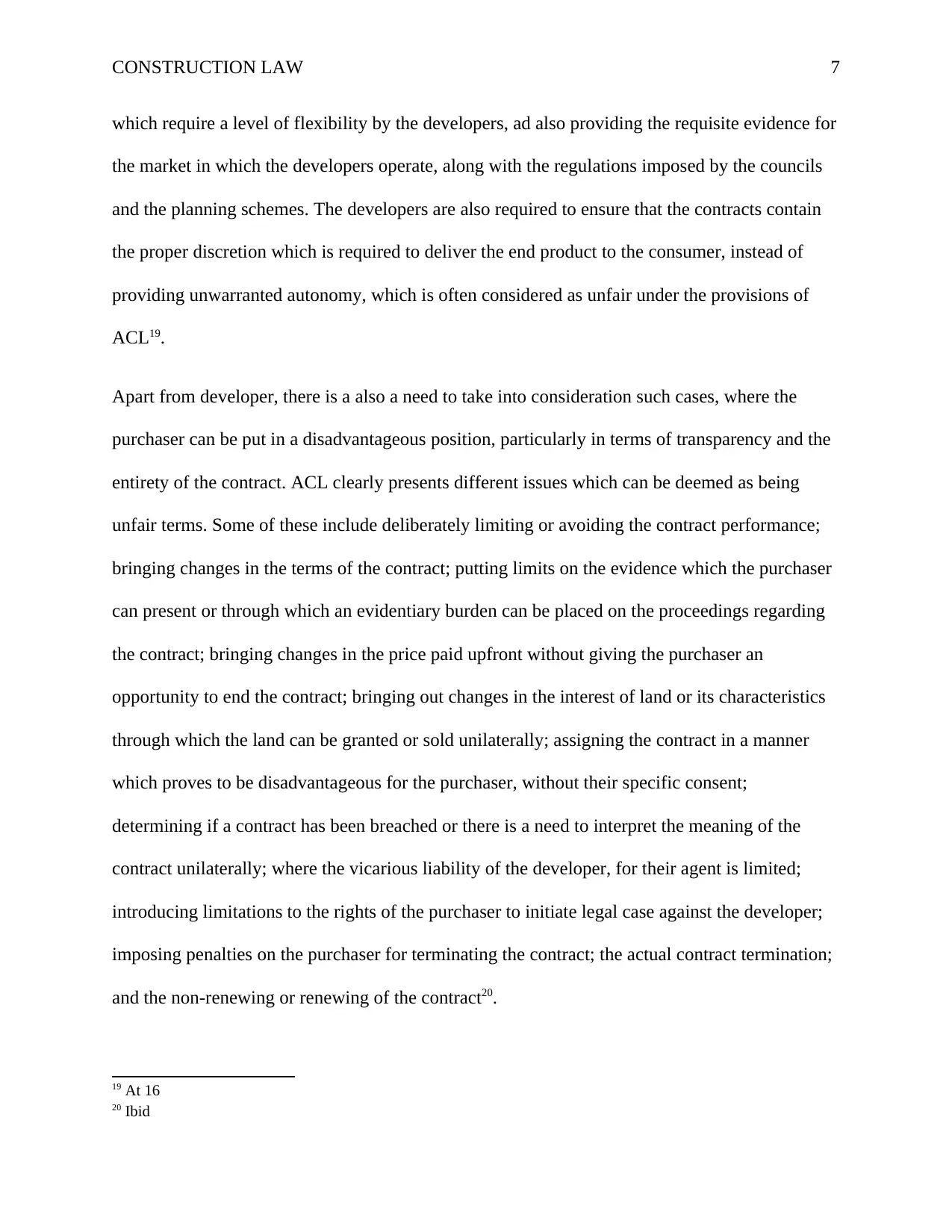
CONSTRUCTION LAW 7
which require a level of flexibility by the developers, ad also providing the requisite evidence for
the market in which the developers operate, along with the regulations imposed by the councils
and the planning schemes. The developers are also required to ensure that the contracts contain
the proper discretion which is required to deliver the end product to the consumer, instead of
providing unwarranted autonomy, which is often considered as unfair under the provisions of
ACL19.
Apart from developer, there is a also a need to take into consideration such cases, where the
purchaser can be put in a disadvantageous position, particularly in terms of transparency and the
entirety of the contract. ACL clearly presents different issues which can be deemed as being
unfair terms. Some of these include deliberately limiting or avoiding the contract performance;
bringing changes in the terms of the contract; putting limits on the evidence which the purchaser
can present or through which an evidentiary burden can be placed on the proceedings regarding
the contract; bringing changes in the price paid upfront without giving the purchaser an
opportunity to end the contract; bringing out changes in the interest of land or its characteristics
through which the land can be granted or sold unilaterally; assigning the contract in a manner
which proves to be disadvantageous for the purchaser, without their specific consent;
determining if a contract has been breached or there is a need to interpret the meaning of the
contract unilaterally; where the vicarious liability of the developer, for their agent is limited;
introducing limitations to the rights of the purchaser to initiate legal case against the developer;
imposing penalties on the purchaser for terminating the contract; the actual contract termination;
and the non-renewing or renewing of the contract20.
19 At 16
20 Ibid
which require a level of flexibility by the developers, ad also providing the requisite evidence for
the market in which the developers operate, along with the regulations imposed by the councils
and the planning schemes. The developers are also required to ensure that the contracts contain
the proper discretion which is required to deliver the end product to the consumer, instead of
providing unwarranted autonomy, which is often considered as unfair under the provisions of
ACL19.
Apart from developer, there is a also a need to take into consideration such cases, where the
purchaser can be put in a disadvantageous position, particularly in terms of transparency and the
entirety of the contract. ACL clearly presents different issues which can be deemed as being
unfair terms. Some of these include deliberately limiting or avoiding the contract performance;
bringing changes in the terms of the contract; putting limits on the evidence which the purchaser
can present or through which an evidentiary burden can be placed on the proceedings regarding
the contract; bringing changes in the price paid upfront without giving the purchaser an
opportunity to end the contract; bringing out changes in the interest of land or its characteristics
through which the land can be granted or sold unilaterally; assigning the contract in a manner
which proves to be disadvantageous for the purchaser, without their specific consent;
determining if a contract has been breached or there is a need to interpret the meaning of the
contract unilaterally; where the vicarious liability of the developer, for their agent is limited;
introducing limitations to the rights of the purchaser to initiate legal case against the developer;
imposing penalties on the purchaser for terminating the contract; the actual contract termination;
and the non-renewing or renewing of the contract20.
19 At 16
20 Ibid
Paraphrase This Document
Need a fresh take? Get an instant paraphrase of this document with our AI Paraphraser
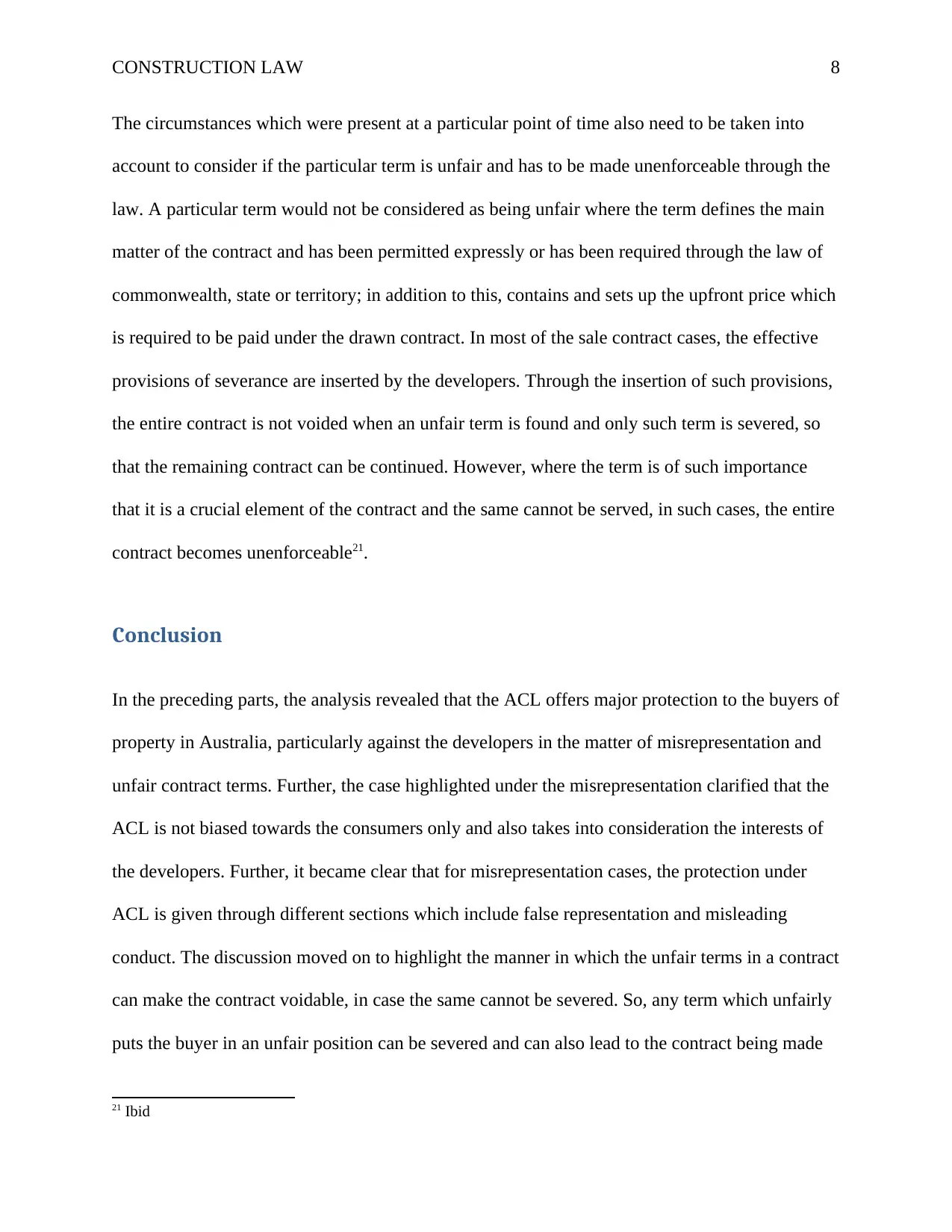
CONSTRUCTION LAW 8
The circumstances which were present at a particular point of time also need to be taken into
account to consider if the particular term is unfair and has to be made unenforceable through the
law. A particular term would not be considered as being unfair where the term defines the main
matter of the contract and has been permitted expressly or has been required through the law of
commonwealth, state or territory; in addition to this, contains and sets up the upfront price which
is required to be paid under the drawn contract. In most of the sale contract cases, the effective
provisions of severance are inserted by the developers. Through the insertion of such provisions,
the entire contract is not voided when an unfair term is found and only such term is severed, so
that the remaining contract can be continued. However, where the term is of such importance
that it is a crucial element of the contract and the same cannot be served, in such cases, the entire
contract becomes unenforceable21.
Conclusion
In the preceding parts, the analysis revealed that the ACL offers major protection to the buyers of
property in Australia, particularly against the developers in the matter of misrepresentation and
unfair contract terms. Further, the case highlighted under the misrepresentation clarified that the
ACL is not biased towards the consumers only and also takes into consideration the interests of
the developers. Further, it became clear that for misrepresentation cases, the protection under
ACL is given through different sections which include false representation and misleading
conduct. The discussion moved on to highlight the manner in which the unfair terms in a contract
can make the contract voidable, in case the same cannot be severed. So, any term which unfairly
puts the buyer in an unfair position can be severed and can also lead to the contract being made
21 Ibid
The circumstances which were present at a particular point of time also need to be taken into
account to consider if the particular term is unfair and has to be made unenforceable through the
law. A particular term would not be considered as being unfair where the term defines the main
matter of the contract and has been permitted expressly or has been required through the law of
commonwealth, state or territory; in addition to this, contains and sets up the upfront price which
is required to be paid under the drawn contract. In most of the sale contract cases, the effective
provisions of severance are inserted by the developers. Through the insertion of such provisions,
the entire contract is not voided when an unfair term is found and only such term is severed, so
that the remaining contract can be continued. However, where the term is of such importance
that it is a crucial element of the contract and the same cannot be served, in such cases, the entire
contract becomes unenforceable21.
Conclusion
In the preceding parts, the analysis revealed that the ACL offers major protection to the buyers of
property in Australia, particularly against the developers in the matter of misrepresentation and
unfair contract terms. Further, the case highlighted under the misrepresentation clarified that the
ACL is not biased towards the consumers only and also takes into consideration the interests of
the developers. Further, it became clear that for misrepresentation cases, the protection under
ACL is given through different sections which include false representation and misleading
conduct. The discussion moved on to highlight the manner in which the unfair terms in a contract
can make the contract voidable, in case the same cannot be severed. So, any term which unfairly
puts the buyer in an unfair position can be severed and can also lead to the contract being made
21 Ibid
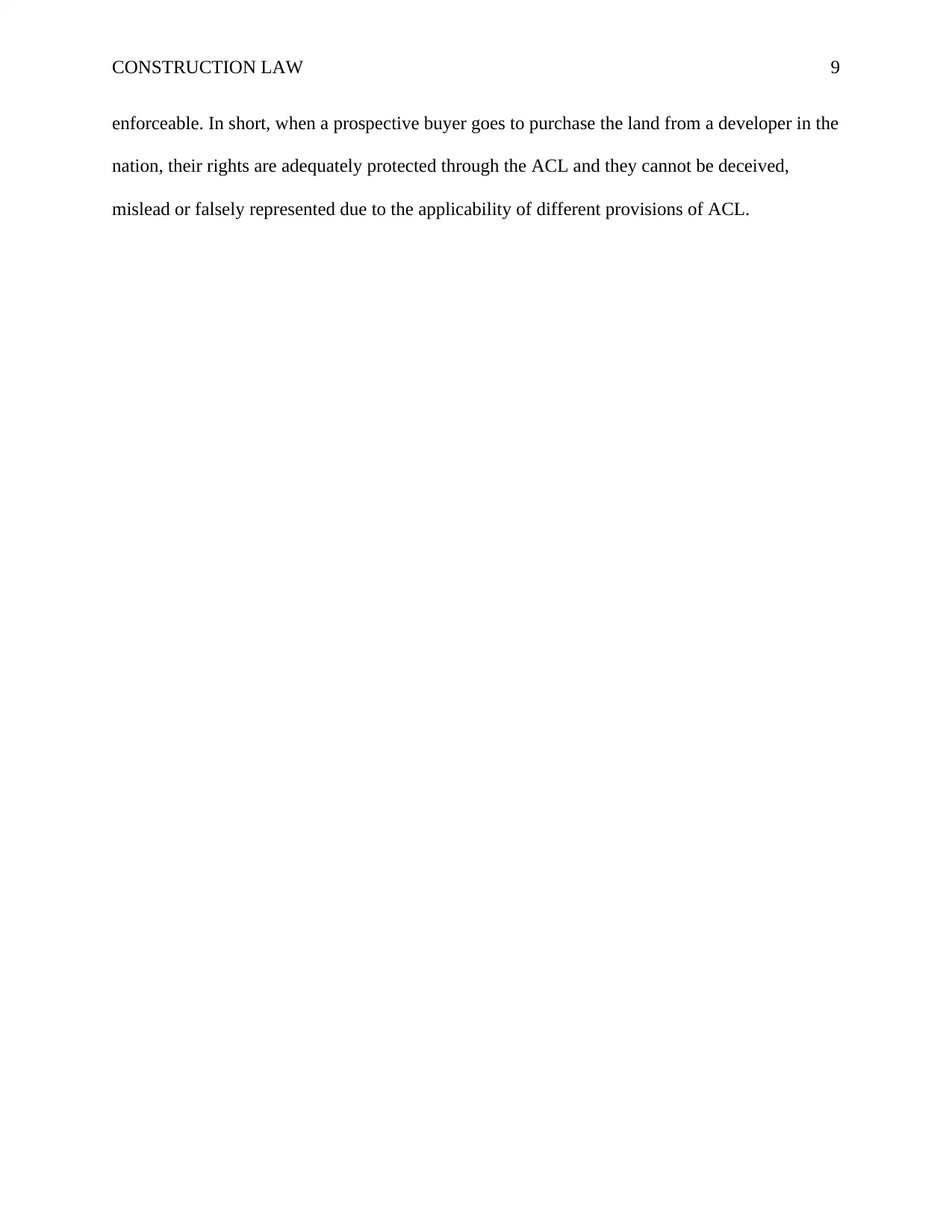
CONSTRUCTION LAW 9
enforceable. In short, when a prospective buyer goes to purchase the land from a developer in the
nation, their rights are adequately protected through the ACL and they cannot be deceived,
mislead or falsely represented due to the applicability of different provisions of ACL.
enforceable. In short, when a prospective buyer goes to purchase the land from a developer in the
nation, their rights are adequately protected through the ACL and they cannot be deceived,
mislead or falsely represented due to the applicability of different provisions of ACL.
⊘ This is a preview!⊘
Do you want full access?
Subscribe today to unlock all pages.

Trusted by 1+ million students worldwide
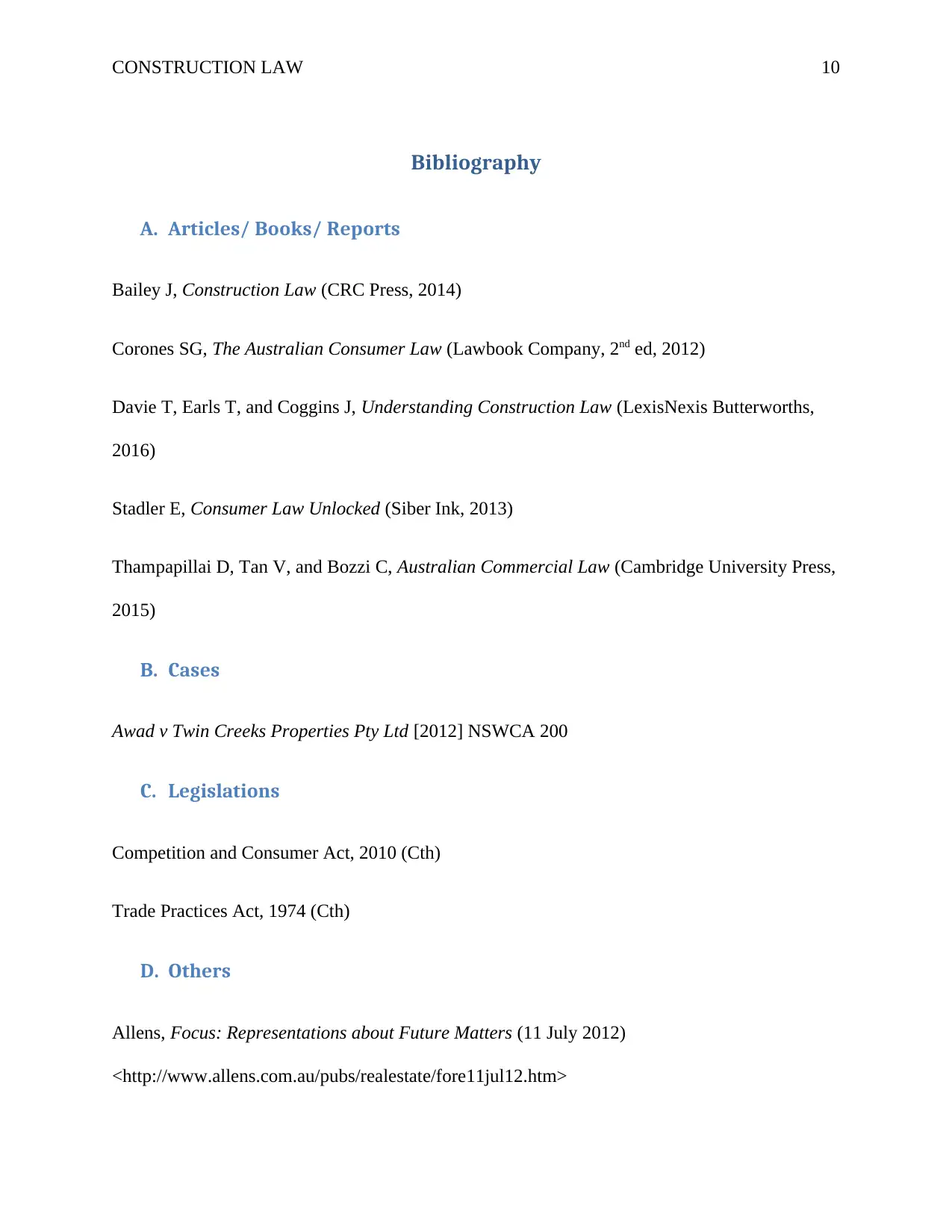
CONSTRUCTION LAW 10
Bibliography
A. Articles/ Books/ Reports
Bailey J, Construction Law (CRC Press, 2014)
Corones SG, The Australian Consumer Law (Lawbook Company, 2nd ed, 2012)
Davie T, Earls T, and Coggins J, Understanding Construction Law (LexisNexis Butterworths,
2016)
Stadler E, Consumer Law Unlocked (Siber Ink, 2013)
Thampapillai D, Tan V, and Bozzi C, Australian Commercial Law (Cambridge University Press,
2015)
B. Cases
Awad v Twin Creeks Properties Pty Ltd [2012] NSWCA 200
C. Legislations
Competition and Consumer Act, 2010 (Cth)
Trade Practices Act, 1974 (Cth)
D. Others
Allens, Focus: Representations about Future Matters (11 July 2012)
<http://www.allens.com.au/pubs/realestate/fore11jul12.htm>
Bibliography
A. Articles/ Books/ Reports
Bailey J, Construction Law (CRC Press, 2014)
Corones SG, The Australian Consumer Law (Lawbook Company, 2nd ed, 2012)
Davie T, Earls T, and Coggins J, Understanding Construction Law (LexisNexis Butterworths,
2016)
Stadler E, Consumer Law Unlocked (Siber Ink, 2013)
Thampapillai D, Tan V, and Bozzi C, Australian Commercial Law (Cambridge University Press,
2015)
B. Cases
Awad v Twin Creeks Properties Pty Ltd [2012] NSWCA 200
C. Legislations
Competition and Consumer Act, 2010 (Cth)
Trade Practices Act, 1974 (Cth)
D. Others
Allens, Focus: Representations about Future Matters (11 July 2012)
<http://www.allens.com.au/pubs/realestate/fore11jul12.htm>
Paraphrase This Document
Need a fresh take? Get an instant paraphrase of this document with our AI Paraphraser
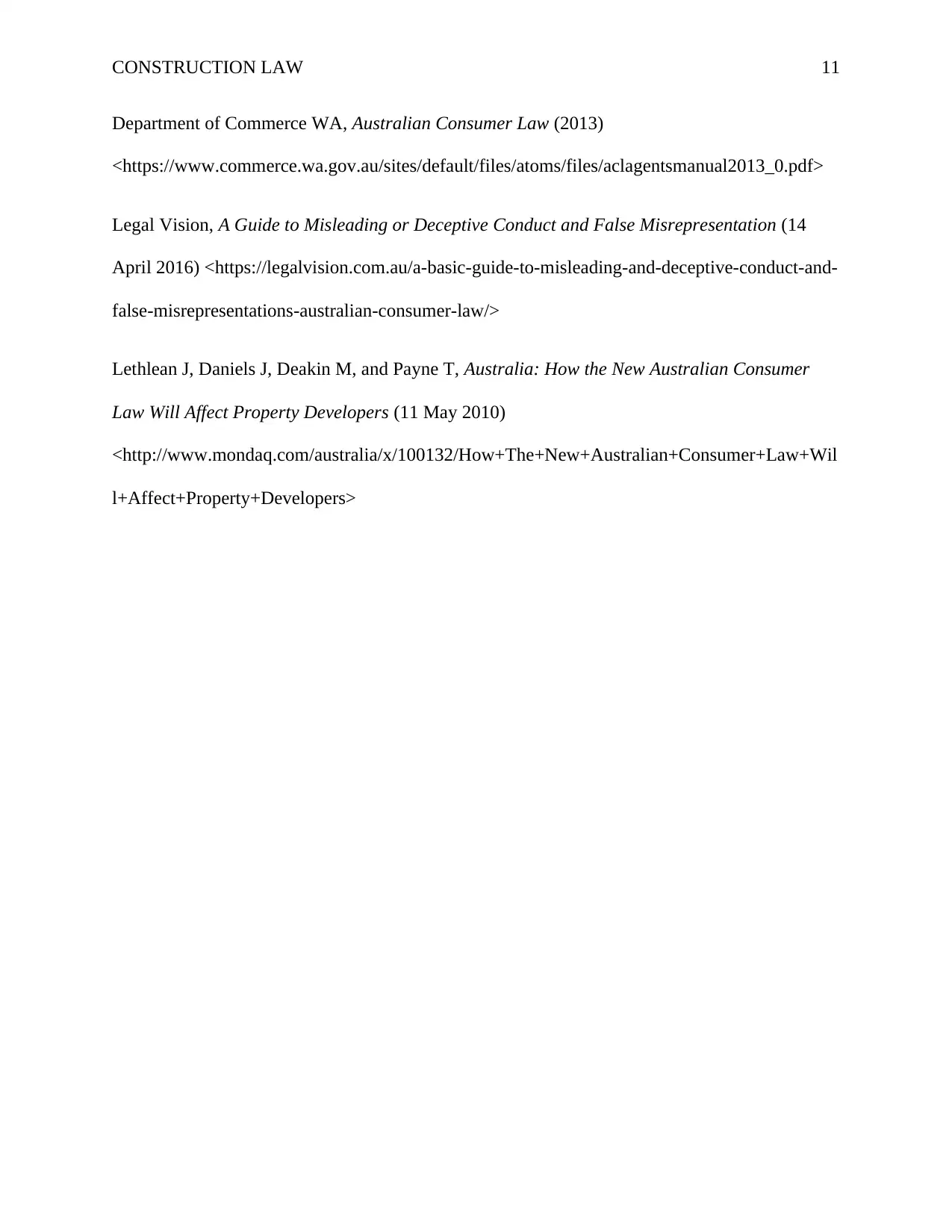
CONSTRUCTION LAW 11
Department of Commerce WA, Australian Consumer Law (2013)
<https://www.commerce.wa.gov.au/sites/default/files/atoms/files/aclagentsmanual2013_0.pdf>
Legal Vision, A Guide to Misleading or Deceptive Conduct and False Misrepresentation (14
April 2016) <https://legalvision.com.au/a-basic-guide-to-misleading-and-deceptive-conduct-and-
false-misrepresentations-australian-consumer-law/>
Lethlean J, Daniels J, Deakin M, and Payne T, Australia: How the New Australian Consumer
Law Will Affect Property Developers (11 May 2010)
<http://www.mondaq.com/australia/x/100132/How+The+New+Australian+Consumer+Law+Wil
l+Affect+Property+Developers>
Department of Commerce WA, Australian Consumer Law (2013)
<https://www.commerce.wa.gov.au/sites/default/files/atoms/files/aclagentsmanual2013_0.pdf>
Legal Vision, A Guide to Misleading or Deceptive Conduct and False Misrepresentation (14
April 2016) <https://legalvision.com.au/a-basic-guide-to-misleading-and-deceptive-conduct-and-
false-misrepresentations-australian-consumer-law/>
Lethlean J, Daniels J, Deakin M, and Payne T, Australia: How the New Australian Consumer
Law Will Affect Property Developers (11 May 2010)
<http://www.mondaq.com/australia/x/100132/How+The+New+Australian+Consumer+Law+Wil
l+Affect+Property+Developers>
1 out of 11
Related Documents
Your All-in-One AI-Powered Toolkit for Academic Success.
+13062052269
info@desklib.com
Available 24*7 on WhatsApp / Email
![[object Object]](/_next/static/media/star-bottom.7253800d.svg)
Unlock your academic potential
Copyright © 2020–2026 A2Z Services. All Rights Reserved. Developed and managed by ZUCOL.





